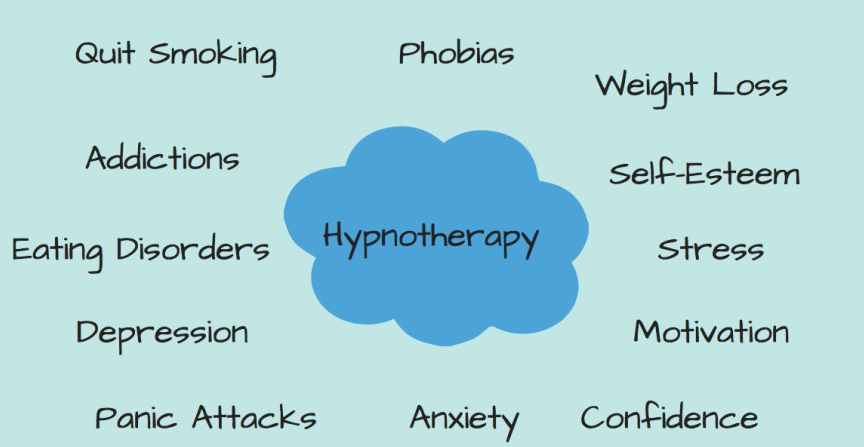
What Is Hypnotherapy?
Hypnotherapy is a type of complementary therapy that uses hypnosis, an altered state of consciousness, to help patients cope with physical and emotional pain, aid in healing from illness or injury, and make positive lifestyle changes.
Contrary to popular belief, hypnotherapy is not about a hypnotist taking control of your mind and making you do things against your will.
It is also used to help people manage stress and anxiety, overcome fears and phobias, quit smoking, etc. Contrary to popular belief, hypnotherapy is not about a hypnotist taking control of your mind and making you do things against your will. Instead it is a powerful form of psychotherapy that creates trust between therapist and patient by utilising guided relaxation techniques to induce a trance-like state.
During this heightened mental state the patient’s conscious mind becomes less dominant allowing for indirect suggestion to be used which helps them access their subconscious in order to identify potential underlying issues in order to begin the healing process.
What Does A Typical Hypnotherapy Session in Belfast Involve?
A hypnotherapy session typically begins with the hypnotherapist introducing and explaining the process of hypnosis to their client.

-
Develop Rapport
The therapy typically involves first developing a rapport with the client in order for them feel comfortable enough during the session.
In this process, they will discuss –
- why the client has come in for treatment,
- what their goals are, and
- how long it may take to reach them.
-
Deep Mental and Physical Relaxation
The therapist will then guide the client through a session of deep mental and physical relaxation, using methods such as
- imagery,
- breathing exercises, and
- positive affirmations.
-
Induction of Hypnosis
This is followed by the induction of hypnosis – a period in which the client’s conscious mind is put into an altered state of consciousness. During this period, the client is more open to suggestion and can be guided by the therapist to address their needs.
After the induction of hypnosis, the therapist will continue to work with their client to set goals for treatment and help them achieve those goals.
-
Re-orientation
The session usually ends with a period of re-orientation in which the client slowly comes back from their state of hypnosis.
-
Post-Hypnosis Review
The therapist may then provide suggestions on how to reinforce positive behaviors and habits outside of session in order for the client’s progress to continue developing.
Hypnotherapy can be used as a powerful tool to help people overcome obstacles they are facing and create positive change in their lives. It has been shown time again that hypnotherapy can be an effective form of therapy for those struggling with addiction, anxiety, depression, and stress-related issues.
With the help of a skilled hypnotherapist who has experience in providing treatment that is tailored to the client’s individual needs, hypnosis can be used as an effective strategy to empower clients to take control of their thoughts and feelings and make lasting changes in their lives.
Are there Any Reasons Why Someone Should Not Use Hypnotherapy?
Yes, there are certain reasons why someone should not use hypnotherapy.
- MENTAL ILLNESS: People who have serious mental illnesses such as schizophrenia or clinical depression should avoid it,
- HISTORY OF TRAUMA: Those with a personal history of traumatic experiences should be cautious when considering hypnotherapy since it may cause flashbacks to the trauma,
- PREGNANCY: individuals who are pregnant or
- UNDER THE INFLUENCE: under the influence of drugs and/or alcohol should not use this form of therapy either.
NB – Consulting a doctor beforehand is highly recommended before engaging in any type of hypnotic therapy session.
What is the Difference Between Hypnosis & Hypnotherapy?
HYPNOTHERAPY
Hypnotherapy is a form of psychotherapy used to create subconscious change in a patient in the form of new responses, thoughts, attitudes and feelings.
It uses hypnosis, which is an altered state of consciousness induced by a trained therapist or self-hypnosis. Hypnosis typically involves guiding a person into an altered state to access his or her inner resources and potentials for healing and improved functioning.
HYPNOSIS
On the other hand, hypnosis is an artificially-induced trance like state characterised by extreme suggestibility during which certain ideas or suggestions can be accepted without critical analysis or resistance.
In addition to providing relaxation, hypnosis has been found beneficial in behavioral modification therapy as well as in treating physical and psychological conditions such as insomnia and substance abuse.
When is Hypnotherapy Most Effective?
Hypnotherapy can be a highly effective treatment for a variety of physical, emotional, and psychological issues.

Studies have found that it can be particularly useful in relieving symptoms of anxiety and depression, reducing stress levels, improving sleep quality, improving self-confidence and self-esteem, as well as reducing pain both physical and emotional. Additionally, hypnotherapy can help people with phobias or fears to work on their triggers more effectively.
Hypnotherapy is often used alongside more traditional therapies such as cognitive behavioural therapy (CBT), helping individuals to increase their understanding of their own behaviour patterns so they can make positive changes in the way they think about themselves and the world around them.
It also helps to break destructive patterns of thought and behaviour by allowing the client to identify areas which need improvement; this could involve dealing with issues such as lack of motivation or low self-esteem.
What sets hypnotherapy apart from other forms of therapy is its ability to access deep parts of our mind that cannot be accessed consciously.
Through this process we are able to tap into our subconscious mind – where many of our innermost thoughts and feelings reside – in order to change old beliefs or habits that may have been preventing us from achieving our goals. Once these new beliefs are established then we can move forward with greater confidence and inner peace.
Another benefit of hypnotherapy is that it can help individuals gain control over unwanted behaviours such as overeating or substance abuse.
By accessing our subconscious mind we are better able to understand why these behaviours occur, enabling us to make conscious decisions about how we want to live our lives in the future including helping us better deal with the following issues –
Hypnotherapy Treatments Have Been Found to Be Effective in Treating the Following Conditions:
-
Anxiety
Hypnotherapy has been shown to be effective in treating anxiety. One study found that hypnotherapy was as effective as cognitive behavioral therapy (CBT) in treating anxiety disorders. Hypnotherapy can help to reduce anxiety by helping people to relax and to focus on positive thoughts and images.
-
Depression
Hypnotherapy has also been shown to be effective in treating depression. One study found that hypnotherapy was more effective than CBT in treating depression. Hypnotherapy can help to reduce depression by helping people to relax and to focus on positive thoughts and images.
-
Pain
Hypnotherapy can also be used to help relieve pain. One study found that hypnotherapy was as effective as CBT in treating chronic pain. Hypnotherapy can help to reduce pain by helping people to relax and to focus on positive thoughts and images.
-
IBS
Irritable bowel syndrome (IBS) is a common condition that causes abdominal pain, bloating, and constipation or diarrhea. Hypnotherapy has been shown to be effective in treating IBS.
One study found that hypnotherapy was more effective than CBT in treating IBS symptoms. Hypnotherapy can help to reduce IBS symptoms by helping people to relax and to focus on positive thoughts and images.
-
Insomnia
Hypnotherapy can also be used to treat insomnia. One study found that hypnosis was more effective than CBT in treating insomnia.
Hypnosis can help to induce sleep by helping people to relax and to focus on positive thoughts and images.
-
Migraines
Migraines are a type of headache that can cause severe pain, nausea, and vomiting. Hypnotherapy has been shown to be effective in treating migraines.
One study found that hypnosis was more effective than CBT in reducing the frequency of migraines. Hypnosis can help to reduce migraines by helping people to relax and to focus on positive thoughts and images
At its core hypnotherapy helps us develop greater mental resilience and self-awareness so that whatever life throws at us we are equipped with the tools necessary to deal with it effectively. This makes it an invaluable treatment for those looking for a long-term solution rather than simply treating the symptoms of their issues without addressing the root cause.
Working with Qualified & Professionally Trained Belfast Hypnotherapists
To become a qualified hypnotherapist, one must typically have completed an accredited hypnotherapy course from an established institution or organisation.
This may involve completing classes, workshops, and/or practical training in order to receive certification. Generally speaking, the more comprehensive the training the better suited one will be for providing quality hypnotherapy services.
In addition to completing an accredited program, many practitioners go on to obtain additional qualifications and certifications. These can include advanced courses such as Neuro-Linguistic Programming (NLP), Cognitive Behavioral Therapy (CBT), trauma therapies, EMDR/EMT, regression therapy and so on.
Having specific qualifications in these areas can help demonstrate a greater level of expertise in their field and further develop knowledge of methods that can produce successful outcomes with clients.
When selecting an accredited course to become qualified as a hypnotherapist it is important to ensure that the provider offers up-to-date accreditation and is recognised by professional bodies such as The National Council for Hypnotherapy (NCH). This provides assurance that certain standards are being met when one is trained and also sets a benchmark for consistent delivery of high standard services once they have been certified.
In some countries there are other requirements that need to be fulfilled before someone can practice professionally as a hypnotherapist; this could include obtaining legal registration from organisations such as the UK Health & Care Professions Council (HCPC). It is therefore essential when researching courses that any relevant legislation is taken into consideration prior to qualification being obtained.
Typically, how many hypnotherapy sessions are required?
RTT is a very specialised hypnotherapy treatment that works in 1-3 sessions.
Find Your Happy Life – Belfast’s Foremost Hypnotherapy Clinic
Julie Wood is well-known as one of Belfast’s leading Hypnotherapists. To find out more please phone 077 9627 7003 or leave a message on our contact page here.



